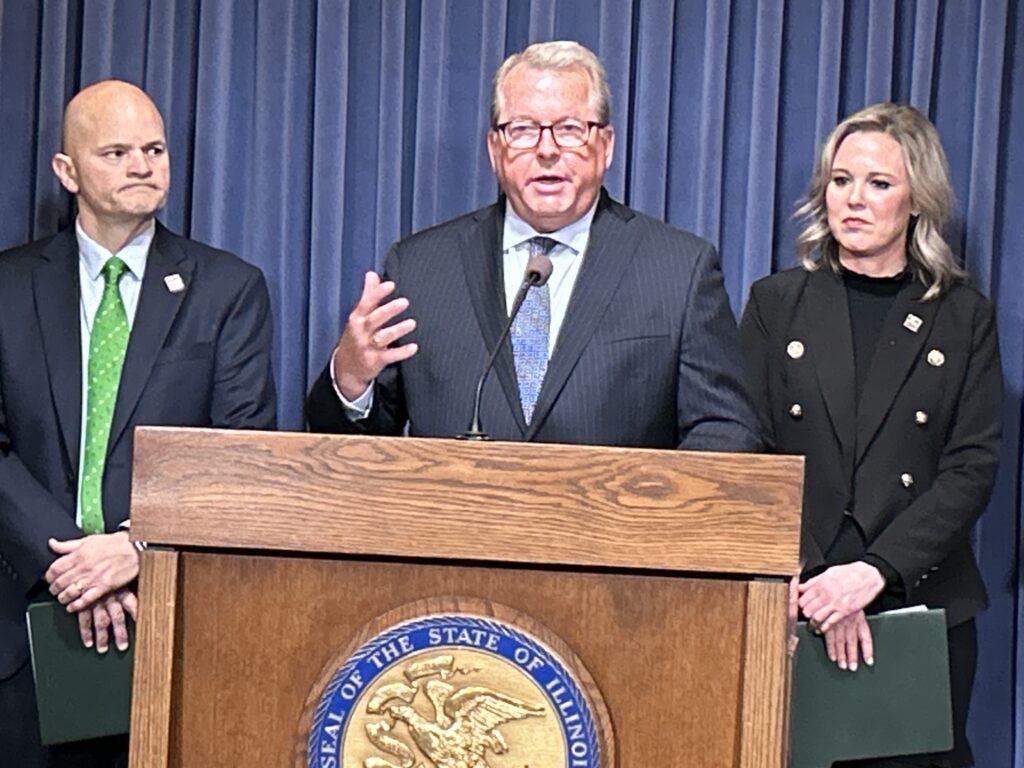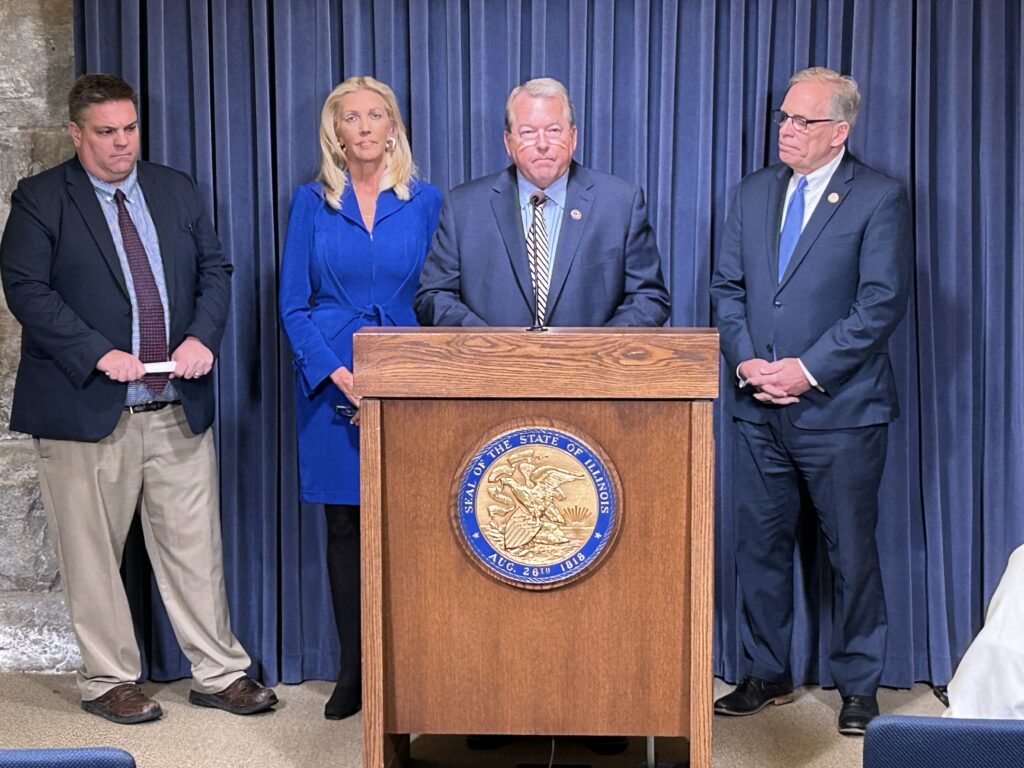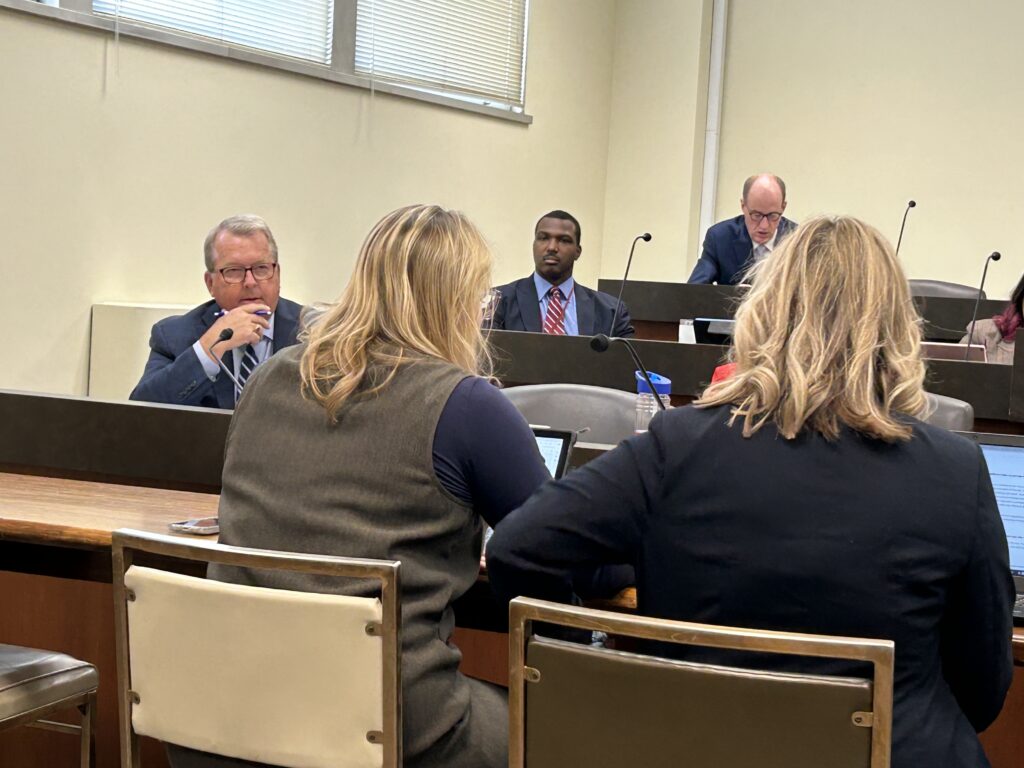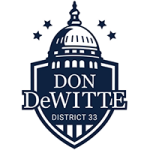DeWitte Joins IMA for Unveiling of 2024 Legislative Agenda

Last Tuesday morning I stood with the Illinois Manufacturing Association (IMA) and a bipartisan coalition of lawmakers as IMA unveiled a 2024 legislative agenda that aims to strengthen Illinois’ workforce, advance cutting-edge technology, and assist with the state’s clean energy goals.
Within the IMA package of bills, I am proud to serve as the Chief Sponsor of Senate Bill 163, which would make a temporary Research & Development Tax Credit in Illinois permanent. The R & D credit has been in place since 1986 and has never been modernized.
There are tens of thousands of open technology jobs in the State of Illinois right now, and legislators need to create a pathway that entices students and adults into this vital field. The IMA package of bills, including my SB 163, addresses the job vacancy issue from several angles, including helping with student loan repayment, a scholarship program for high school students, research and development tax credits, and a pilot program that offers free childcare on-site at manufacturing facilities.
The R & D credit sunsets every five years, which creates a level of uncertainty and a lack of predictability. We need a permanent- or at least a long-term- extension and modernization of the program to ensure we are fostering the most innovative ideas in our state.
In the past few decades, the U.S. share of R & D has dropped from nearly 40 percent to just more than 10 percent. This has occurred while China has increased its R & D by 400 percent.
This is about competitiveness, business attraction, and building our state’s economy. The Governor has been given close to $1 billion for a “business closure fund” in order to attract new business investment in our state, but we must do more for businesses that have already invested in our state to give them incentives to stay in Illinois and grow their businesses.
DeWitte Joins Senate Republicans to Highlight Democrats’ Misplaced Priorities for Healthcare Cost

On Thursday I joined three of my Senate Republican colleagues at a press conference where we highlighted the misplaced priorities that allow noncitizens to receive healthcare at nearly no cost while Illinoisans continue to pay hefty premiums and co-pays for the same services. We explained how the free healthcare for noncitizens program has ballooned from an estimated $2 million to over $1 billion in just a few years, and drove home the point that Illinois taxpayers are not only paying premiums and co-pays for their own health insurance, but the taxes they pay are also covering the cost of healthcare for the hundreds of thousands of noncitizens that have come to Illinois. In the photo above I am shown (L-R) with Senate Republican budgeteer Chapin Rose, and JCAR member Sue Rezin, and Senate Republican Healthcare expert Senator Dave Syverson.

As you may know, I sit on the bipartisan and bicameral Joint Committee on Administrative Rules (JCAR). Last week we had an opportunity to question Governor JB Pritzker’s Department of Human Services (DHS), and despite the Governor putting out a press release proclaiming that co-pays are back, we learned that they really aren’t. We were told at the JCAR meeting that managed care providers can decide whether or not they will charge co-pays and that one of the largest providers in Cook County has already announced they will not. DHS officials acknowledged that mandatory co-pays will only exist for overnight hospital stays and surgical procedures.
Over the last several months, lawmakers were told the cost of healthcare for noncitizens for the current fiscal year would not exceed $550 million. At JCAR, DHS officials admitted they were already over budget and said noncitizen healthcare costs were now predicted to be $770 million this year, an almost 50% increase over the cost that was initially promised.
Republicans File Legislation to Stop Mishandling of Human Remains
In the fall of 2023, the Sangamon County Coroner launched an investigation into a funeral home and crematorium in downstate Carlinville, leading to allegations that the business provided more than 80 families with the wrong remains, with some of the remains being permanently lost, and that the business improperly stored bodies, allowing them to decompose in unrefrigerated settings.
Following the coroner’s announcement, Republicans began drafting legislation to ensure the horrific events never happen again. Senate Bill 3263 would make it a Class 4 Felony to knowingly and intentionally provide inaccurate documentation of the identity of human remains, store human remains in violation of Illinois law, or provide misidentified human remains. The law would apply to all individuals authorized to treat, transport, or store human remains, which would include funeral homes and crematoriums.
Identical legislation has been filed in the Illinois House.
Valentines, Valentines, and More Valentines!

Over the last few days, my staff and I delivered about 4,000 valentines to seniors living in nursing homes and assisted living centers throughout the 33rd Senate District. I cannot thank the residents of the 33rd District enough for the valentines that were dropped off by my families, church and school groups, and others from organizations in this area. The smiles on the seniors’ faces were priceless!

DCEO and IMEC Launch “Made in Illinois” Grant Program to Boost Manufacturing
The Illinois Department of Commerce and Economic Opportunity (DCEO) is partnering with the Illinois Manufacturing Excellence Center (IMEC) to create the Made in Illinois grant program. A total of $1 million in funding has been allocated to this program, which will provide up to $50,000 in matching grant funding to small and mid-sized Illinois manufacturers. Through the matching fund grants, Illinois manufacturers can meet growing market demands and expand their businesses.
To be eligible for the grants, companies must be operational in Illinois for over three years and employ between five and 250 people. This grant will be accepting applications through March 31st. For more information on the Made in Illinois program visit www.imec.org/madeinillinois.
Illinois Celebrates Black History Month
February is Black History Month, and during this time each year we highlight the positive contributions African Americans have had on the country and state. Black History Month began as Negro History Week when it was created by historian Carter G. Woodson through his organization the Association for the Study of Negro Life and History (ASNLH) in 1926. Woodson’s week was the 2nd week in February largely due to noted abolitionist Frederick Douglass and former President Abraham Lincoln’s birthdays. From this it slowly grew into an unofficial month of celebration. This growth led to President Gerald Ford officially recognizing the Month in 1976 by imploring the public to honor the accomplishments of Black Americans.
Since this initial proclamation, every President has endorsed a specific theme for Black History Month, with this year’s theme being “African Americans and the Arts”. The popularity of this idea has spread across the globe as Ireland, France, Germany, Canada, the United Kingdom, and 7 countries in Africa now also celebrate the month.
The Illinois Department of Commerce and Economic Opportunity (DCEO) will host a virtual panel on Wednesday, February 14th at 10:00 AM that includes business leaders from across the state. The leaders will discuss their respective organizations, lessons learned, and the history of black business in Illinois. For more information on this panel please visit https://dceo.illinois.gov/bhm2024.html.
Statewide Initiative with Google Improves Access to Children’s Behavioral Health Resources
The Illinois Department of Human Services (DHS) and Google Public Sector are partnering to create a new program called Behavioral Health Care and Ongoing Navigation (BEACON). The program includes a service portal for Illinois youth to help them access behavioral and mental health resources. BEACON will utilize Google’s cloud to keep all information on the portal secure and accessible. The Division of Mental Health (DMH) at DHS will be spearheading this effort to centralize behavioral health resources for Illinois families.
It is anticipated the program will benefit children and families that regularly engage with the Department of Public Health (DPH), the Illinois State Board of Education (ISBE), the Department of Children and Family Services (DCFS), the Department of Healthcare and Family Services (HFS), and the Department of Human Services (DHS). BEACON will rely on human-centered artificial intelligence and will serve as a preventative measure by intervening in children’s lives earlier to prevent further trauma from occurring. It will also help children learn positive ways to deal with and heal from trauma they have experienced.

